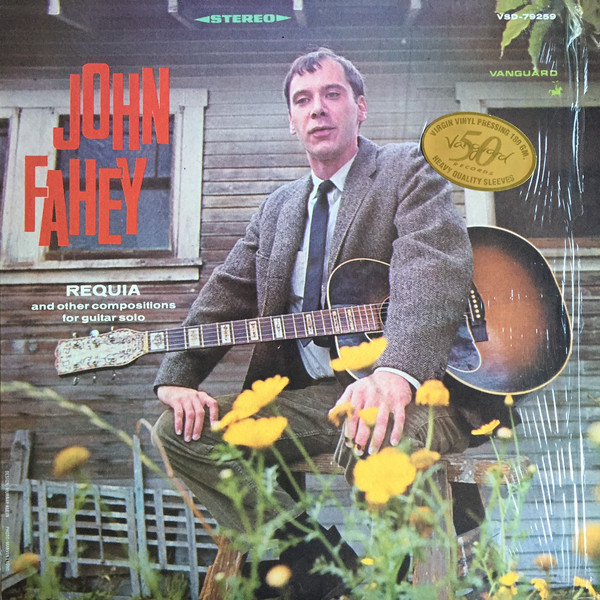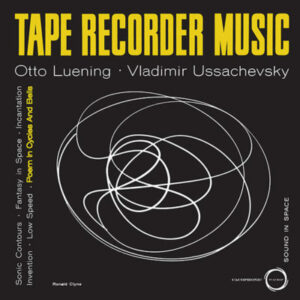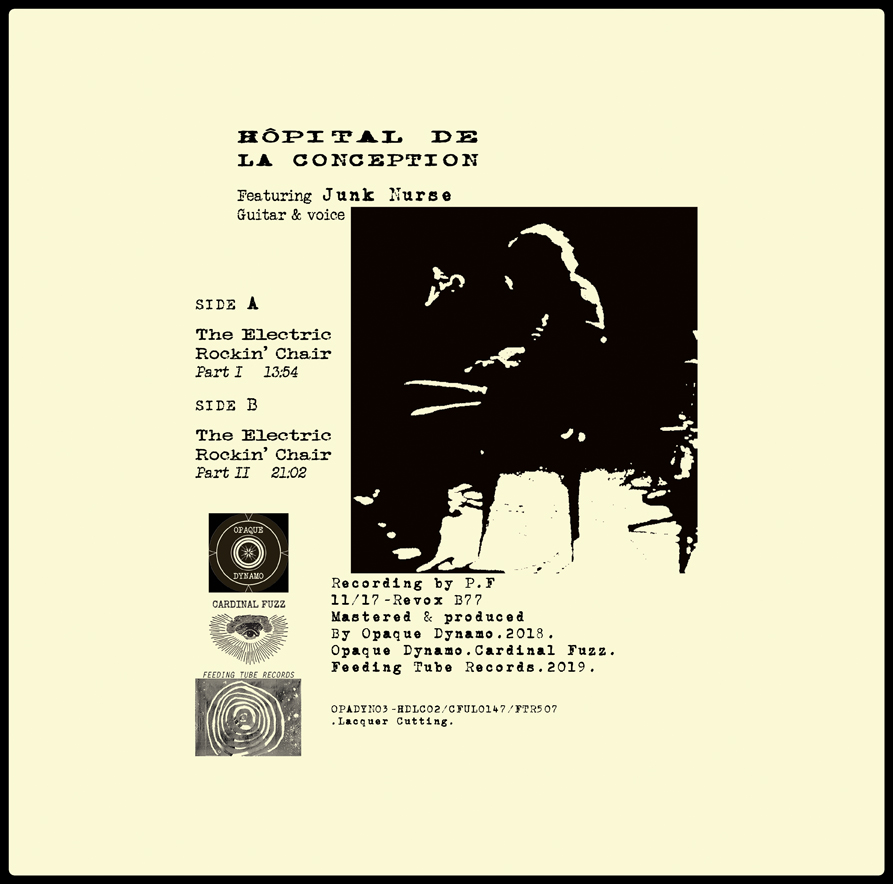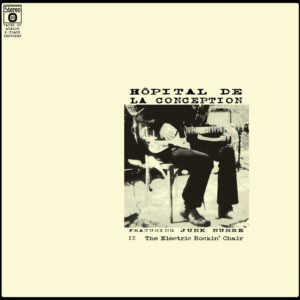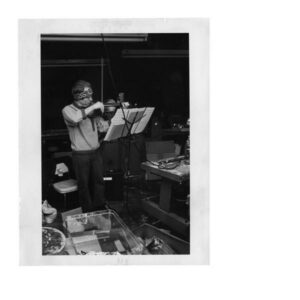John Fahey / Requia (Vinyl LP)
22,50€
Reissue / 180gr LP – deluxe heavy paste-on cover
Label: Vanguard
In stock
Description
Reissue / 180gr LP deluxe heavy paste-on cover
Full Title : Requia & Other Compositions For Guitar Solo
Inspired by ‘The Thief Of Bagdad’, Mississippi John Hurt, a great-uncle Russell Blaine Cooper, Knott’s Berry Farm Molly, Old Grandad 100% prof and a wilful approach to tuning, John Fahey produced these Requia and other compositions for guitar. Finishing with a hymn of course.
1967-USA
Format: Vinyl LP
#Ref: VSD 79259
Release date: 2006
Notes
A truly essential Fahey album. 1967’s ‘Requia’ his first, of two, for folk giants Vanguard brought out some of the most boundary defying music of his career to date. Side one features the enduring and beautiful ‘Requiem for John Hurt’, ‘Requiem for Russell Blaine Cooper’ and the triumphant ‘When the Catfish is in Bloom’ but things get a lot stranger on side two which is mostly taken up by the epic ‘Requiem for Molly’ finding Fahey’s guitar weaving in an out of a sometimes deranged musique concrete soundscape of effects and found sounds that Fahey created with Sam Charters and Barry Hansen. All before ending with the hymn ‘Fight On Christians, Fight On’.
JOHN FAHEY: Since 1948, after seeing the movie, The Thief of Bagdad, I composed cerebral symphonies every day. It was a pleasant pastime. But suddenly in 1953 I needed a full orchestra at my command – me playing every instrument in that impossible ensemble (Impossible! It would have had to include a full Western High-Art orchestra, bagpipes, Rahet Ek Lek, Saron, Sarangi, Gender and numerous other instruments). Furthermore, there was no time to study composition, conducting etc.
Besides I was too young. I needed it then, immediately, to drown out with music, the new disturbing sounds I heard emanating for my own fear and ignorance of the ways of men and women; from the contempt I felt for the fact that I had no driver’s license; and so far of course I had to drown out the sound of the traffic on the road east. Now I have learned to drive quite well, have a license, and see that I have learned the ways of men and women just as well, but unfortunately a little too late. So in celebration of time wasted I continue to play the guitar.
I made an orchestra out of the guitar. It was immediately available to me, from Sears and Roebuck. My friends, who already plated it assured me that I could learn the rudiments quickly. I bought one but employed no teachers. I could tolerate none, nor they me. Would there have been a wise and quick teacher – one who knew more than the music on the page, on the radio, in the concert hall – one who knew the music of men and women. Perhaps he could have taught me about that instead. I would prefer that it would have been that way. But there was no teacher like that around. So I taught myself all these things, and now I must play. I quickly found that I can temper the guitar as I like. I can play my own tunings.
I can do whatever I like with it. I am quite free with my guitar. But I am not free of it. For some remunerative neck-strap has strung me to it. I myself am no freer that one of the strings on it. And in what does that freedom consist but to be tuned up and down – or to break. But a broken string is thrown away even if it was “dead” before, being no longer of any use to anyone at all. No not that.
The new social-action theologians (and many laymen as well) speak frequently of freedom these days – a new kind, they say. But I know of only one perfect freedom – and that comes to us instantaneously, at one time or another, or not at all, when we are given a chance to gamble. You hear about the game (which might frighten you) and then either you play or you don’t. If you do play you find you are free whether you win the game or not. If you don’t play, then you become (or remain) a slave. There is no middle way. And it is a rather grisly kind of gambling too, because you don’t even know what the stakes are or the identity of your gambling partner. You have to take a chance – a big chance. But if you don’t take that chance, don’t choose to gamble, you lose your freedom until the next game – if there is one. There is no fall up (Tillich notwithstanding), and the pressing need for social-action is self-evident to anyone who is awake.
I know this from experience for I used to be a gambler – cards, dice and I worked in a pool-hall. Once a new shark came to town. He was an honest shark. He told everyone that he was looking for opponents who would play for big money. But I didn’t feel like playing that day. So I didn’t. Cowards are not free, even if – especially if, they are cowards no longer, but were once. Thus I must pay. You can’t bring the past up into the future. You can’y have both at the same time. That’s all there is to it.
I’d like to find out where that shark is and play him now, win or lose. But maybe that isn’t my game anymore, and it wouldn’t make any difference. I wonder what my game is, and if I’ll be given a chance to play it with a worthy opponent. I certainly hope so. Regarding the songs:
JOHN HURT: Although it was not John (wrong sex anyway) who through a gentle voice and pleasant demeanor (yet he had this about him too) served as my primary impetus to play the guitar, it was nevertheless he, and others who played like him – but mainly he who provided me with my first technical model (emotional model to some extent also) for playing the guitar. He was the first I heard who played in the three-finger, non-choking, “picking” style, and he was one of the best. He was in his quiet way, a very great man, and I deeply mourn our loss of him. So, I wrote this requiem for him, about him, but I play it the way Charley Patton would have played it, had he ever thought of such a thing, which of course he never would have. The tuning is open C, and the central theme is Patton’s rather unusual variant of “Jesus is a Dying-Bed-Maker” – unusual because the tune has an autological flatted fifth in it, played against the tonic chord which never changes. This makes the mode Lydian. Most unusual, but that’s the way Patton sang it on Pm. 12986.
RUSSEL BLAINE COOPER: A Great-Uncle of mine. I heard him talk once in 1957. The song sounds to me like the way he talked. He was among other things a teacher, a soldier in WWI, and he gave a demonstration of Springfield rifle sharp shooting for Teddy Roosevelt in Chillicothe, Ohio in 1917. And I’m sure he did much else of which I am unaware. Open D, with the third string tuned up to a fourth instead of a third.
WHEN THE CATFISH IS IN BLOOM: Perhaps those who have never gone cat-fishing on some large river like the Potomac or the Sligo will not be able to cope with this song. Who has seen them in bloom? Who has not? Composed April 23, 1966 at the Golden Ring Coffee House in Clarement, California. To some extent inspired by the presence of Beautiful Linda Gretchell and Old Grand Dad, 100 proof. Open C, with no third (top two strings unison), Ionian, American, Ragaesque.
KNOTT’S BERRY FARM MOLLY: “Her body moves, but does her spirit?” Let us hope so. She was (is?) well known at Knott’s Berry Farm. I don’t know where she is now. The sound effects reflect nothing political as does none of my music. This song is about Molly’s psychological destruction and the reaction of another person in observing this process, for which he was perhaps, to some extent responsible. I have heard that she recovered a bit. Standard tuning, modulates between the keys of C and F# major.
FIGHT ON CHRISTIANS, FIGHT ON: A hymn, as always, to end.
Tracklisting
A1. Requiem For John Hurt / A2. Requiem For Russell Cooper / A3. When The Catfish Is In Bloom
B1. Requiem For Molly (Part 1) / B2. Requiem For Molly (Part 2) / B3. Requiem For Molly (Part 3) / B4. Requiem For Molly (Part 4) / B5. Fight On Christians, Fight On
Audio | Video
Dig It Too !
- Add to cart Out Of Stock
- Select options This product has multiple variants. The options may be chosen on the product page
- Add to cart Out Of Stock

